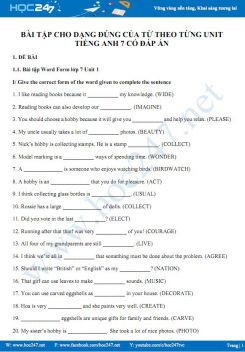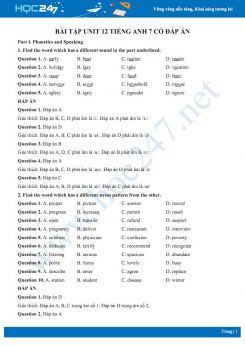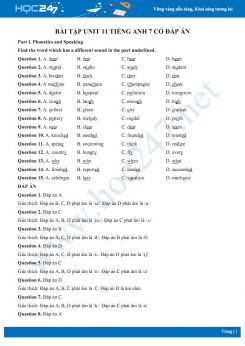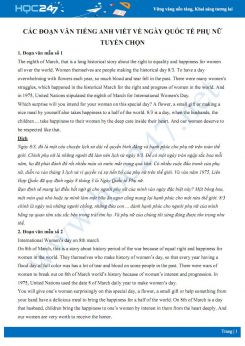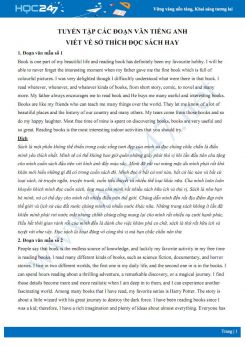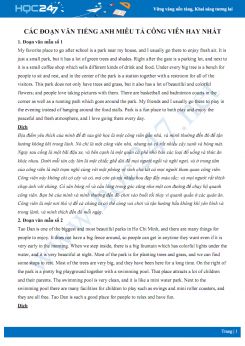Nhß║▒m gi├║p c├Īc em ├┤n tß║Łp v├Ā kh├Īi qu├Īt c├│ hß╗ć thß╗æng nß╗Öi dung ngß╗» ph├Īp quan trß╗Źng trong chŲ░ŲĪng tr├¼nh Hß╗Źc k├¼ 2 Tiß║┐ng Anh 7, HOC247 mß╗Øi c├Īc em tham khß║Żo chi tiß║┐t nß╗Öi dung t├Āi liß╗ću Ngß╗» ph├Īp trß╗Źng t├óm Tiß║┐ng Anh 7 Hß╗Źc k├¼ 2. Vß╗øi nß╗Öi dung ├┤n tß║Łp cß╗ź thß╗ā, hi vß╗Źng c├Īc em c├│ thß╗ā vß║Łn dß╗źng ho├Ān th├Ānh tß╗æt c├Īc b├Āi tß║Łp ├┤n tß║Łp ─æß╗ā sß║Ąn s├Āng cho k├¼ thi cuß╗æi Hß╗Źc k├¼ 2 sß║»p ─æß║┐n.
Ch├║c c├Īc em hß╗Źc tß╗æt!
1. Hß╗ć thß╗æng kiß║┐n thß╗®c
1.1. Tß╗½ chß╗ē sß╗æ lŲ░ß╗Żng:
- a lot of + N ─æß║┐m ─æŲ░ß╗Żc v├Ā kh├┤ng ─æß║┐m ─æŲ░ß╗Żc
- lots of + N ─æß║┐m ─æŲ░ß╗Żc v├Ā kh├┤ng ─æß║┐m ─æŲ░ß╗Żc
- many + N danh tß╗½ ─æß║┐m ─æŲ░ß╗Żc sß╗æ nhiß╗üu
- much + N kh├┤ng ─æß║┐m ─æŲ░ß╗Żc
Ex: She has lots of / many books.
There is a lot of / much water in the glass.
1.2. C├óu so s├Īnh:
a. So s├Īnh hŲĪn:
- T├Łnh tß╗½ ngß║»n: S + be + adj + er + than..... I am taller than Tuan.
- T├Łnh tß╗½ d├Āi: S + be + more + adj + than.... My school is more beautiful than your school.
b. So s├Īnh nhß║źt:
- T├Łnh tß╗½ ngß║»n: S + be + the + adj + est..... He is the tallest in his class.
- T├Łnh tß╗½ d├Āi: S + be + the most + adj.... My school is the most beautiful.
c. Mß╗Öt sß╗æ tß╗½ so s├Īnh bß║źt qui tß║»c:
- good / well better the best
- bad worse the worst
1.3. Tß╗½ nghi vß║źn:
- what: c├Īi g├¼
- where: ß╗¤ ─æ├óu
- who: ai
- why: tß║Īi sao
- when: khi n├Āo
- how: nhŲ░ thß║┐ n├Āo
- how much: gi├Ī bao nhi├¬u
- how often: hß╗Åi tß║¦n suß║źt
- how long: bao lâu
- how far: bao xa
- what time: mß║źy giß╗Ø
- how much + N: kh├┤ng ─æß║┐m ─æŲ░ß╗Żc c├│ bao nhi├¬u
- how many + N: ─æß║┐m ─æŲ░ß╗Żc sß╗æ nhiß╗üu c├│ bao nhi├¬u
Ex: ______________ do you learn English? - Twice a week.
_______________ have you learn English? ŌĆō For two years.
_______________ is it from your house to your school? ŌĆō It's 3 km
________________ are you? ŌĆō I'm fine. Thanks.
______________ is your mother? ŌĆō She is forty.
______________ do you go to the market? ŌĆō To buy some food.
_______________ is a pen? ŌĆō it's 3,000 dong.
_______________ chairs are there in the class? ŌĆō There are twenty.
_______________ do you get up? ŌĆō At 6 a.m
1.4. Thì
|
Thì |
C├Īch d├╣ng |
Dß║źu hiß╗ću |
V├Ł dß╗ź |
|
SIMPLE PRESENT (Hiß╗ćn tß║Īi ─æŲĪn) - To be: th├¼, l├Ā, ß╗¤ K─É: S + am / is / are P─É: S + am / is / are + not NV: Am / Is / Are + S ŌĆ”? - ─Éß╗Öng tß╗½ thŲ░ß╗Øng: K─É: S + V1 / V(s/es) P─É: S + donŌĆÖt/ doesnŌĆÖt + V1 NV: Do / Does + S + V1 ŌĆ”? |
- chß╗ē mß╗Öt th├│i quen ß╗¤ hiß╗ćn tß║Īi - chß╗ē mß╗Öt sß╗▒ thß║Łt, mß╗Öt ch├ón l├Ł. |
- always, usually, often, sometimes, seldom, rarely (├Łt khi), seldom (hiß║┐m khi), every, once (mß╗Öt lß║¦n), twice (hai lß║¦n) |
- She often gets up at 6 am. - The sun rises in the east. |
|
PRESENT CONTINUOUS (Hiß╗ćn tß║Īi tiß║┐p diß╗ģn) K─É: S + am / is / are + V-ing P─É: S + am / is / are + not + V-ing NV: Am / Is /Are + S + V-ing? |
- h├Ānh ─æß╗Öng ─æang diß╗ģn ra ß╗¤ hiß╗ćn tß║Īi.
|
- at the moment, now, right now, at present - Look! (Nhìn kìa) - Listen! (Lắng nghe kìa) |
- Now, we are learning English. - She is cooking at the moment. |
|
SIMPLE PAST (Qu├Ī khß╗® ─æŲĪn) - To be: K─É: I / He / She / It + was You / We / They + were P─É: S + wasnŌĆÖt / werenŌĆÖt NV: Was / were + S ŌĆ”? - ─Éß╗Öng tß╗½ thŲ░ß╗Øng: K─É: S + V2 / V-ed P─É: S + didnŌĆÖt + V1 NV: Did + S + V1 ŌĆ”.? |
- h├Ānh ─æß╗Öng xß║Ży ra v├Ā chß║źm dß╗®t trong qu├Ī khß╗®. |
- yesterday, last week, last month, ŌĆ”ago, in 1990, in the past, ŌĆ” |
- She went to London last year. - Yesterday, he walked to school. |
|
SIMPLE FUTURE (TŲ░ŲĪng lai ─æŲĪn) K─É: S + will / shall + V1 I will = IŌĆÖll P─É: S + will / shall + not + V1 (wonŌĆÖt / shanŌĆÖt + V1) NV: Will / Shall + S + V1 ŌĆ”? |
- h├Ānh ─æß╗Öng sß║Į xß║Ży ra trong tŲ░ŲĪng lai |
- tomorrow (ng├Āy mai), next, in 2015, tonight (tß╗æi nay), soon (sß╗øm) ŌĆ”. |
- He will come back tomorrow. - We wonŌĆÖt go to school next Sunday. |
* Mß╗Öt sß╗æ ─æß╗Öng tß╗½ bß║źt qui tß║»c khi chia qu├Ī khß╗® ─æŲĪn:
|
Nguyên mẫu |
Qu├Ī khß╗® |
Ngh─®a |
|
- be |
- was / were |
- th├¼, l├Ā, ß╗¤ |
|
- go |
- went |
- ─æi |
|
- do |
- did |
- l├Ām |
|
- have |
- had |
- c├│ |
|
- see |
- saw |
- nh├¼n thß║źy |
|
- give |
- gave |
- cho |
|
- take |
- took |
- lß║źy |
|
- teach |
- taught |
- dß║Īy |
|
- eat |
- ate |
- eaten |
|
- send |
- sent |
- gß╗Łi |
|
- teach |
- taught |
- dß║Īy |
|
- think |
- thought |
- ngh─® |
|
- buy |
- bought |
- mua |
|
- cut |
- cut |
- cß║»t, chß║Ęt |
|
- make |
- made |
- l├Ām |
|
- drink |
- drank |
- uống |
|
- get |
- got |
- c├│, lß║źy |
|
- put |
- put |
- ─æß║Ęt, ─æß╗ā |
|
- tell |
- told |
- kß╗ā, bß║Żo |
|
- lttle |
- less |
- ├Łt hŲĪn |
1.5. Sß╗æ thß╗® tß╗▒:
- first - eleventh - twenty-first
- second - twelfth - twenty-second
- third - thirteenth - twenty-third
- fourth - fourteenth - twenty-fourth
- fifth - fifteenth - twenty-fifth
- sixth - sixteen - ŌĆ”ŌĆ”ŌĆ”ŌĆ”ŌĆ”
- seventh - seventeenth - ŌĆ”ŌĆ”ŌĆ”ŌĆ”..
- eighth - eighteenth - ŌĆ”ŌĆ”ŌĆ”ŌĆ”..
- ninth - nineteenth - ŌĆ”ŌĆ”ŌĆ”ŌĆ”..
- tenth - twentieth - thirtieth
1.6. C├óu cß║Żm th├Īn:
- What + a / an + adj + N!
Ex: What a beautiful house!
What an expensive car!
1.7. Giß╗øi tß╗½
* chß╗ē nŲĪi chß╗æn:
- on - next to
- in (tß╗ēnh, th├Ānh phß╗æ) - behind
- under - in front of
- near (gß║¦n) - beside (b├¬n cß║Īnh)
- to the left / the right of - between
- on the left (b├¬n tr├Īi) - on the right (b├¬n phß║Żi)
- at the back of (ß╗¤ cuß╗æi ŌĆ”) - opposite
- on + t├¬n ─æŲ░ß╗Øng
- at + sß╗æ nh├Ā, t├¬n ─æŲ░ß╗Øng
* chß╗ē thß╗Øi gian:
- at + giß╗Ø - in + th├Īng, m├╣a, n─ām
- on + thß╗®, ng├Āy - from ŌĆ”to
- after (sau khi) - before (trŲ░ß╗øc khi)
Ex: at 6 oŌĆÖclock
in the morning / in the afternoon / in the evening
in August, in the autumn, in 2012
on Sunday, on 20th July
from Monday to Saturday
* chß╗ē phŲ░ŲĪng tiß╗ćn giao th├┤ng: by; on
Ex: by car; by train, by plane
on foot.
1.8. C├óu ─æß╗ü nghß╗ŗ:
- LetŌĆÖs
- Should we + V1 ŌĆ”
- Would you like to
- Why don't you
- What about / How about + V-ing ...?
Ex: What about watching TV?
C├óu trß║Ż lß╗Øi: - Good idea. / Great (tuyß╗ćt) / OK / - IŌĆÖd love to.
- IŌĆÖm sorry, I canŌĆÖt.
Ex: LetŌĆÖs go to the cinema.
Should we play football?
Would you like to go swimming?
1.9. Lß╗Øi hŲ░ß╗øng dß║½n (chß╗ē ─æŲ░ß╗Øng):
- Could you please show me / tell me the way to the ŌĆ”.., please?
- Could you tell me how to get to the ŌĆ”.?
- go straight (ahead) đi thẳng
- turn right / turn left quß║╣o phß║Żi / quß║╣o tr├Īi
- take the first / second street on the right / on the left quß║╣o phß║Żi / tr├Īi ß╗¤ con ─æŲ░ß╗Øng thß╗® nhß║źt / thß╗® hai
Ex: - Excuse me. Could you show me the way to the supermarket, please?
- OK. Go straight ahead. Take the first street on the right. The supermarket is in
front of you
1.10. Ho╠ēi giŲĪ╠Ć: What time is it?
WhatŌĆÖs the time?
Do you have the time?
- GiŲĪ╠Ć ─æu╠üng: ItŌĆÖs + giŲĪ╠Ć + phu╠üt
- GiŲĪ╠Ć hŲĪn: ItŌĆÖs + phu╠üt + past + giŲĪ╠Ć hoß║Ęc ItŌĆÖs + giŲĪ╠Ć + phu╠üt
- GiŲĪ╠Ć k├®m: ItŌĆÖs + ph├║t + to + giß╗Ø hoß║Ęc ItŌĆÖs + giŲĪ╠Ć + phu╠üt
1.11. M├ó╠üt bao l├óu ─æß╗ā la╠Ćm gi╠Ć:
How long does it take + (O) + to V => It takes + (O) + thß╗Øi gian + to VŌĆ”
Ex: How long does it take you to do this homework?
------------------------------------------------------------
1.12. Hß╗Åi v├¬╠Ć khoa╠ēng ca╠üch:
How far is it from ŌĆ”ŌĆ”ŌĆ”ŌĆ”ŌĆ”ŌĆ”to ŌĆ”ŌĆ”ŌĆ”ŌĆ”ŌĆ”? => ItŌĆÖs about + khoß║Żng c├Īch
1.13. Ca╠üch no╠üi nga╠Ćy tha╠üng: Tha╠üng + nga╠Ćy
Hoß║Ęc the + nga╠Ćy + of + tha╠üng
Ex: May 8th; the 8th of May
1.14. Have fun + V_ing: La╠Ćm vi├¬╠Żc g├¼ m├┤╠Żt ca╠üch vui ve╠ē
1.15. Ho╠ēi gia╠ü ti├¬╠Ćn: How much + is / are + S ? => S + is / are + gia╠ü ti├¬╠Ćn
How much + do /does + S + cost ? => S + cost(s) + gia╠ü ti├¬╠Ćn
1.16. Ti╠ünh tŲ░╠Ć ke╠üp:
S├┤╠ü ─æ├¬╠üm - N(─æ├¬╠üm ─æŲ░ŲĪ╠Żc s├┤╠ü i╠üt)
- 15-minute break (co╠ü d├ó╠üu ga╠Żch n├┤╠üi va╠Ć kh├┤ng co╠ü S)
17. Lß╗Øi khuy├¬n:
- S + should / shouldnŌĆÖt
- S + ought to + V1
- S + must
2. B├Āi tß║Łp ├┤n tß║Łp
2.1. Cung cß║źp dß║Īng ─æ├║ng cß╗¦a ─æß╗Öng tß╗½:
1/ It (rain).............................. heavily now. You should (stay)........................... at home and (read).................................books.
2/ What are you (do)................................................at the moment?
- I (write)........................................an essay...
3/ Where Lan and Ba (go).....................tomorrow? They (visit)......................the Museum.
4/ You (have)........................................................................Geography next Friday.
5/ What about (play)....................................a game of chess?
6/ It takes her 10 minutes (make)..................................this toy.
7/ She (be)...................................ten on her next birthday.
8/ I (meet)................................you soon.
9/ Why don't we (hold)...........................a party?
11/ Let's (go).................................camping.
12/ They (practice).....................................playing the guitar in the music room now.
13/ We shouldn't (waste)...............................water.
14/ I'd like (drink)...................................some orange juice.
15/ Hoa usually (do)...................................aerobics early in the morning.
17/ Would you like (come).................................... to my house for lunch?
18/ They (go).............................to visit Hue next summer.
─É├Īp ├Īn
1/ It (rain)ŌĆ”ŌĆ”ŌĆ”ŌĆ”ŌĆ”is rainingŌĆ”ŌĆ”ŌĆ”ŌĆ”ŌĆ” heavily now. You should (stay)ŌĆ”ŌĆ”ŌĆ”ŌĆ”ŌĆ”stayŌĆ”ŌĆ”ŌĆ”ŌĆ” at home and (read) ŌĆ”ŌĆ”ŌĆ”ŌĆ”ŌĆ”readŌĆ”ŌĆ”ŌĆ”ŌĆ”ŌĆ”ŌĆ”books.
2/ What are you (do) ŌĆ”ŌĆ”ŌĆ”ŌĆ”ŌĆ”ŌĆ”ŌĆ”ŌĆ”doingŌĆ”ŌĆ”ŌĆ”ŌĆ”ŌĆ”ŌĆ”ŌĆ”ŌĆ”at the moment?
- I (write) ŌĆ”ŌĆ”ŌĆ”ŌĆ”am writingŌĆ”ŌĆ”ŌĆ”ŌĆ”ŌĆ”ŌĆ”ŌĆ”ŌĆ”ŌĆ”.an essay.. .
3/ Where will Lan and Ba (go) ŌĆ”goŌĆ”ŌĆ”ŌĆ”tomorrow? They (visit) ŌĆ”will visitŌĆ”ŌĆ”..the Museum.
4/ You (have) ŌĆ”ŌĆ”ŌĆ”ŌĆ”ŌĆ”will haveŌĆ”ŌĆ”ŌĆ”ŌĆ”ŌĆ”ŌĆ”ŌĆ”ŌĆ”ŌĆ”Geography next Friday.
5/ What about (play) ŌĆ”ŌĆ”ŌĆ”ŌĆ”playingŌĆ”ŌĆ”ŌĆ”ŌĆ”ŌĆ”ŌĆ”ŌĆ”ŌĆ”a game of chess?
6/ It takes her 10 minutes (make) ŌĆ”ŌĆ”ŌĆ”ŌĆ”to makeŌĆ”ŌĆ”ŌĆ”ŌĆ”ŌĆ”ŌĆ”ŌĆ”.this toy.
7/ She (be) ŌĆ”ŌĆ”ŌĆ”ŌĆ”will beŌĆ”ŌĆ”ŌĆ”ŌĆ”ŌĆ”ŌĆ”ŌĆ”..ten on her next birthday.
8/ I (meet) ŌĆ”ŌĆ”ŌĆ”ŌĆ”will meetŌĆ”ŌĆ”ŌĆ”ŌĆ”ŌĆ”ŌĆ”..you soon.
9/ Why donŌĆÖt we (hold) ŌĆ”ŌĆ”ŌĆ”ŌĆ”holdŌĆ”ŌĆ”ŌĆ”ŌĆ”ŌĆ”a party?
11/ LetŌĆÖs (go) ŌĆ”ŌĆ”ŌĆ”ŌĆ”ŌĆ”ŌĆ”goŌĆ”ŌĆ”ŌĆ”ŌĆ”ŌĆ”camping.
12/ They (practice) ŌĆ”ŌĆ”ŌĆ”practiceŌĆ”ŌĆ”ŌĆ”ŌĆ”ŌĆ”.playing the guitar in the music room now.
13/ We shouldnŌĆÖt (waste) ŌĆ”ŌĆ”ŌĆ”ŌĆ”wasteŌĆ”ŌĆ”ŌĆ”ŌĆ”ŌĆ”ŌĆ”.water.
14/ IŌĆÖd like (drink) ŌĆ”ŌĆ”ŌĆ”ŌĆ”ŌĆ”to drinkŌĆ”ŌĆ”ŌĆ”ŌĆ”ŌĆ”ŌĆ”..some orange juice.
15/ Hoa usually (do) ŌĆ”ŌĆ”ŌĆ”ŌĆ”ŌĆ”doesŌĆ”ŌĆ”ŌĆ”ŌĆ”ŌĆ”ŌĆ”..aerobics early in the morning.
17/ Would you like (come) ŌĆ”ŌĆ”ŌĆ”ŌĆ”to comeŌĆ”ŌĆ”ŌĆ”ŌĆ”ŌĆ”ŌĆ”ŌĆ”ŌĆ” to my house for lunch?
18/ They (go) ŌĆ”ŌĆ”ŌĆ”ŌĆ”will goŌĆ”ŌĆ”ŌĆ”ŌĆ”ŌĆ”..to visit Hue next summer.
2.2. Sß║»p xß║┐p lß║Īi c├óu bß╗ŗ x├Īo trß╗Ön:
1/ always/ class/ time/ we/ to/ come/ on.
ŌåÆ.............................................................
2/ hours/ week/ often/ does/ how/ he/ many/ a/ work?
ŌåÆ.............................................................
3/ not/ American/ uniforms/ do/ usually/ school/ wear/ students.
ŌåÆ.............................................................
4/ 10:00/ at/ Wednesday/ Science/ Nam/ class/ on/ has.
ŌåÆ.............................................................
5/ interesting/ I/ because/ Math/ it/ like/ is.
ŌåÆ.............................................................
6/ like/ what/ does/ subject/ best/ Tom?
ŌåÆ.............................................................
7/ you/ work/ to/ want/ we/ with.
ŌåÆ.............................................................
8/ Know/ you/ do/ likes/ he/ how/ meat?
ŌåÆ.............................................................
9/ There/ excuse/ a/!/ post/ is/ me/ near/ office/ here?
ŌåÆ.............................................................
10/ That/ you/ the/ ,/ want/ is/ post/ letter/ to/ Mai?
ŌåÆ.............................................................
11/ Is/ interested/ Mai/ experiments/ doing/ in.
ŌåÆ.............................................................
12/ him/ tell/ I'll/ please/ call/ after/ 5/ again.
ŌåÆ.............................................................
13/ Huong/ be/ November 20th/ ,/ twelve/ on/ will/ Saturday.
ŌåÆ.............................................................
─É├Īp ├Īn
1. We always come to class on time
2. How many hours does he often work a week?
3. American students do not usually wear school uniforms.
4. Nam has Science class at 10:00 on Wednesday.
5. I like Math because it is interesting.
6. What subject does Tom like best?
7. We want to work with you.
8. How do you know he likes meat?
9. Excuse me! Is there a post office near here?
10. That is the letter you want to post, Mai?
11. Mai is interested in doing experiments.
12. IŌĆÖll tell him please call after 5 again.
13. Huong will be twelve on November 20th Saturday.
2.3. Viß║┐t lß╗ŗa c├óu c├│ chß╗®a tß╗½ trong ngoß║Ęc
1. Glenne Close hasnŌĆÖt won a single Oscar. She has been nominated six times, (although)
____________________________________________________________________________
2. Brian Stone is a famous singer. He canŌĆÖt sing folk song. (despite)
____________________________________________________________________________
3. Some people said the film was terrible. I found it quite gripping. (Though)
____________________________________________________________________________
4. It was a horror film. It wasnŌĆÖt frightening at all. (in spite of)
____________________________________________________________________________
5. The movie was a box-office failure. It had an all-star cast. (even though)
____________________________________________________________________________
6. The film had good reviews. It was entirely ignored by awards bodies. (despite)
____________________________________________________________________________
─É├Īp ├Īn
1. Although Glenn Close has been nominated six times, she hasnŌĆÖt won a single Oscar.
Or: Glenn Close hasnŌĆÖt won a single Oscar although she has been nominated six times.
2. Despite being a famous singer, Brian Stone canŌĆÖt sing folk songs.
3. Though some people said the film was terrible, I found it quite gripping./ I found the film quite gripping though some people siad it was terrible.
4. In spite of being horror film, it was not frightening at all
5. The movie was a box-office failure even though it had an all-star cast./ Even though the movie had an all-star cast, it was a box-officer failure.
6. Despite good reviews, the film was entirely ignored by awards bodies
2.4. ─Éß╗Źc ─æoß║Īn v─ān sau v├Ā trß║Ż lß╗Øi c├óu hß╗Åi
We use many different energy sources to do work for us. Energy sources are classified into two groups - renewable and nonrenewable.
Non-renewable energy sources are those that take millions of years to form and will run out some day. It is energy that comes from fossil fuels such as coal, crude oil, and natural gas. Fossil fuels are mainly made up of carbon and were formed millions of years ago. The chemical reaction which takes place when we burn fossil fuels releases carbon compounds such as carbon monoxide and carbon dioxide into the air. Carbon dioxide is one of the green house gases which is contributing to global warming and air pollution.
On the other hand, renewable energy sources will never run out, are better for the environment and do not cause pollution. Renewable energy is often called green energy because it is a natural energy, always available and does not have to be formed like nonrenewable energy. The green energy is always there. For example, the Sun consistently shines, water is abundant, and the winds blow throughout the year. The five types include solar, energy from the Sun; geothermal, energy from heat within the Earth; hydroelectric, energy from moving water; biomass, energy from dead plants and microorganisms and finally, energy from the wind.
1. What are fossil fuels?
_____________________________________________
2. When were fossil fuels formed?
_____________________________________________
3. Do carbon dioxide emissions causes climate change on Earth?
_____________________________________________
4. How many types of renewable energy sources are there? What are they?
_____________________________________________
5. Are renewable sources bad for the environment?
_____________________________________________
6. Why is renewable energy called green energy?
_____________________________________________
─É├Īp ├Īn
1. Fossil fuels are coal, crude oil, and natural gas
2. Fossil fuels were formed millions of years ago
3. Yes, they do
4. There are five types of renewable energy sources. They are solar, geothermal, hydroelectric, biomass and wind
5. No, they arenŌĆÖt
6. Because it is a natural energy, always available and does not have to be formed like non-renewable energy
---
Tr├¬n ─æ├óy l├Ā to├Ān bß╗Ö nß╗Öi dung t├Āi liß╗ću Ngß╗» ph├Īp trß╗Źng t├óm Tiß║┐ng Anh 7 Hß╗Źc k├¼ 2. ─Éß╗ā xem th├¬m nhiß╗üu t├Āi liß╗ću tham khß║Żo hß╗»u ├Łch kh├Īc c├Īc em chß╗Źn chß╗®c n─āng xem online hoß║Ęc ─æ─āng nhß║Łp v├Āo trang hoc247.net ─æß╗ā tß║Żi t├Āi liß╗ću vß╗ü m├Īy t├Łnh.
Hy vß╗Źng t├Āi liß╗ću n├Āy sß║Į gi├║p c├Īc em hß╗Źc sinh ├┤n tß║Łp tß╗æt v├Ā ─æß║Īt th├Ānh t├Łch cao trong hß╗Źc tß║Łp.
C├Īc em quan t├óm c├│ thß╗ā tham khß║Żo tŲ░ liß╗ću c├╣ng chuy├¬n mß╗źc:
- B├Āi tß║Łp cho dß║Īng ─æ├║ng cß╗¦a tß╗½ theo tß╗½ng Unit Tiß║┐ng Anh 7 c├│ ─æ├Īp ├Īn
- B├Āi tß║Łp Unit 12 Tiß║┐ng Anh 7 c├│ ─æ├Īp ├Īn
Ch├║c c├Īc em hß╗Źc tß║Łp tß╗æt!
T├Āi liß╗ću li├¬n quan
TŲ░ liß╗ću nß╗Ģi bß║Łt tuß║¦n
- Xem thêm






